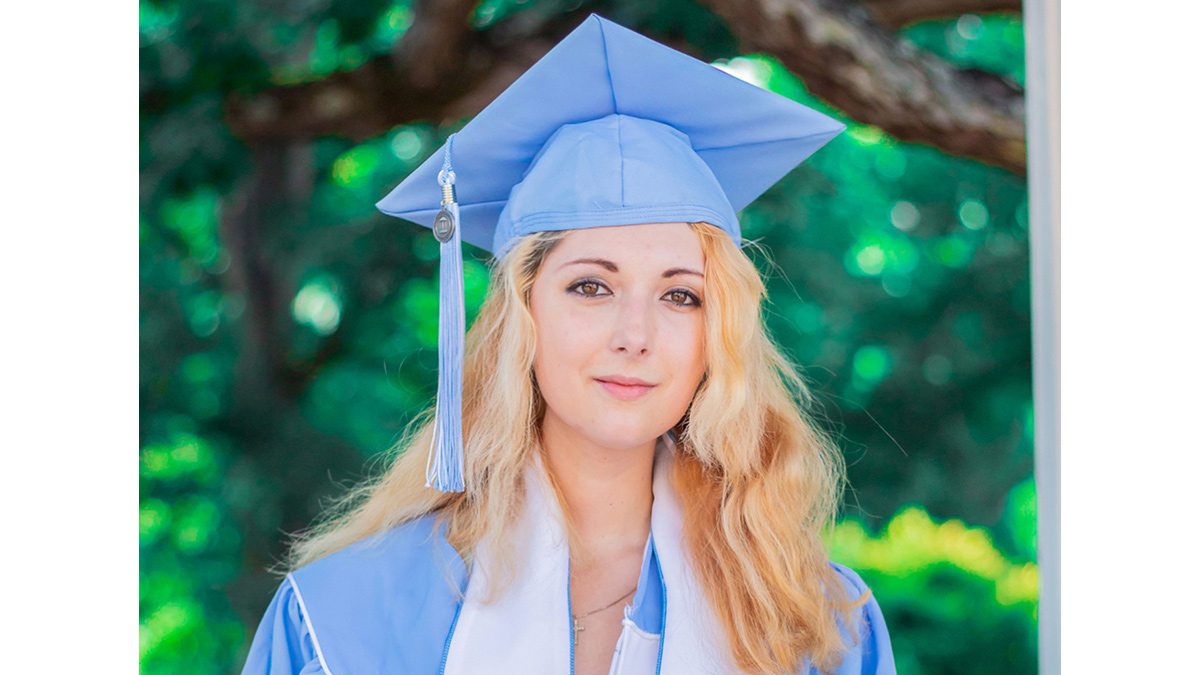Senior Nicole Toms hopes to use her Carolina degree in environmental sciences and minors in sustainability studies and geographic information sciences to help others see the collective power of their baby steps around the issues that will save the world.

The natural world has always been important to Nicole Toms.
Born in Latvia and raised by her grandparents in Florida, she found herself forging her own path from an early age. One constant in her life was her love for the outdoors, for its beauty and its refuge, and as she grew up, she recognized how central conservation is to sustaining not only her own well-being but also the systems we rely on.
Toms graduates this December with a degree in environmental sciences and minors in sustainability studies and geographic information sciences. A first-generation college student, Carolina Covenant Scholar and an Office of Undergraduate Research Student Ambassador, she has a unique and measured perspective on the future of sustainability, one borne of her own experiences in the world: baby steps.
“We take for granted how much falls on the environment being stable. The Earth can survive without humans, but we can’t survive without the Earth. We have to start fixing this,” she said. “But we have to think long term in small ways: promoting green energy technologies, working for urban sustainability, especially in areas that can’t afford to make huge changes, and encouraging people to start living sustainable lifestyles.”
With this approach, she said, “the dominoes will start to fall into place.”
These kinds of baby steps have been essential to her own success. It’s how she went from a talented student who shied away from hard sciences to a student who took a genetics class for fun and was constantly reading ahead. Step-by-step, she’s juggled classes while working multiple jobs on- and off-campus, taken extra coursework needed to travel for a semester with the Institute for the Environment’s Thailand Field Site, spent hours in Davis Library teaching herself complex engineering concepts and GIS systems, and landed an unexpected labor of love in the Division of Comparative Medicine’s Zebrafish Aquaculture Lab.
“I’m always trying something new in science because I love it so much, but I’ve also had to work at it. When I applied for a research-based work-study position, I thought I’d be in a chemistry lab,” Toms said. “But I got into the husbandry lab for zebrafish, which they use to study human genotyping. It was one of the best things that happened to me. I took care of the fish and raised them. I cared for their embryos, I did the lab work, and I absolutely loved being there.”
With what she describes as a tough family life growing up, Toms had learned to make her family where she found it, which often led her to connect with her teachers as she sought input on schoolwork. At Carolina, she counts close relationships with faculty — particularly with Amy Cooke, director of Undergraduate Studies in the Environment, Ecology and Energy program, and Bob Pleasants, associate director at Carolina’s Office for Undergraduate Research — as inspiring her career trajectory and motivating her.
“Dr. Cooke is a fantastic, powerful woman who is phenomenally intelligent,” she said. “She inspires me to be a leader in environmental sciences and in STEM, which can be a challenging field for women. Dr. Pleasants has given me so much mental support — whenever I’ve felt like quitting, he always comes back with ‘How can I help support you?’”
Her next goal is to find a career helping others build sustainable lives, whether that’s in building sustainable structures or working to help lower-resourced areas make the sustainable changes to communities and infrastructure that will help them last.
Big changes are scary, she said, which tends to stop people where they are instead of encouraging them forward. She wants to use her life experiences, strong-willed workstyle and adaptable mindset to help others see the collective power of their baby steps around the issues that will save the world.
“There’s something called ‘environmental depression,’ where people hope for big changes, for miracles, and then it all seems so impossible that they can’t even try,” she said. “You have to remember that things like electricity and running water all came with trial and error. Miracles don’t just happen – they come from baby steps, and I want to help people complete and appreciate those steps. If you think about the future impact, you don’t lose hope.”
By Courtney Mitchell, University Communications
